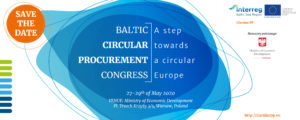Circular procurement is on the agenda in many Finnish municipalities. In the end of August, CircularPP project organized in co-operation with the Circwaste -network an online event on circular procurement capacity building focusing on construction sector and food and catering. The aim of the event was to create dialogue between procurers and suppliers, learn to implement strategic circular aims to practice and solve main obstacles that have been recognized in circular public procurement. The event was targeted to public procurers in the Circwaste -network of 11 pioneering municipalities in circular economy, but everyone interested in the issue was welcome to join. There were altogether almost 30 participants.
”Public procurement offers many possibilities for municipalities to reach their sustainability and circular targets” said Ms Katriina Alhola, a senior researcher in Finnish Environment Institute, and opened the event. Leader of the construction sector in Lappeenranta municipality, Ms Katri Tolvanen, pointed out the importance of a clear procurement strategy and alignments that would guide the procurement process to low carbon and circular direction. Quality manager, Ms Heidi Karlsson from Teijo-Talot Ltd highlighted the possibilities of public procurers to boost circular solutions by requiring them in public tendering. Currently, there already exist many circular solutions in the construction sector, for example, modular houses that can easily be modified or even moved from a city to another depending on the need.
Manager of public catering in city of Turku, Ms Suvi Haukioja, illustrated the carbon footprint (CF) of catering services and actions that they have taken in order to tackle the most important elements of CF in catering, i.e., the content of meal and food waste. Currently, they can set requirements for the number of vegetarian meals per week, but a reliable CF calculator would be needed in order to set CF as an award criterion. Sales director Ms Mervi Mikkola from Compass Group revealed that suppliers monitor the sustainability strategies and targets of public procurers and can respond their needs. There already exist sustainability criteria for food products in Finland, that is very useful when used systematically. This set of sustainability criteria for food products is currently being updated, told a specialist, Ms Elina Ovaskainen from Motiva Ltd, a state-owned sustainable development company. It was also discussed that in order to implement changes in recipes, the end users should be listened carefully – otherwise the change will not happen.
In the workshop session, participants discussed actively in smaller groups about the potential solutions to the obstacles that have been identified in circular public procurement in practice. The discussants saw that the commitment from the management and decisions makers should be stronger. This could be strengthened by their visits e.g., to the realized circular buildings and sites. In addition, the management should be better informed about circular public procurement and its implications in the municipality. In addition, clear procurement alignments are needed, in which circular aspects are clearly stipulated. Also, the use of available guidance, such as the services provided by the KEINO Competence centre, would ease the work load of procurers. Other recommended means included using of requests for information of circular options, organizing joint market dialogue events and joint procurement as well as sharing of good practices and learning from examples and experiences from others. Sustainable cities networks, such as Circwaste, could provide an excellent platform for co-operation.
Participants considered also their own roles and tasks that they could do in their daily work to promote circular procurement in their municipalities. Delivering information, organizing dialogue and connecting people from different departments were considered as possible means to take the action.
In the end of the webinar, a specialist from ICLEI, Ms Ashleigh McLennan, representing also CircularPP project, provided the participants with highly motivated speech and examples from CircularPP partnering countries. Participants left the webinar with new ideas on circular procurement and new way of thinking.
Katriina Alhola, SYKE


